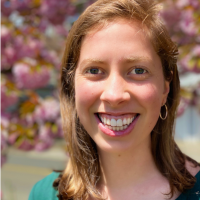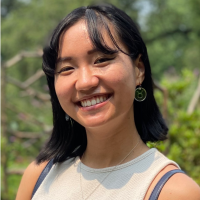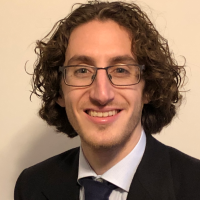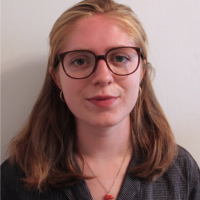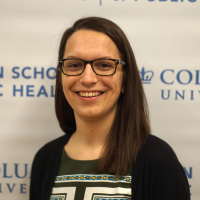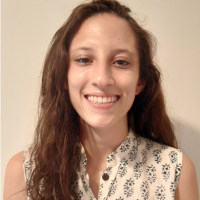Predoctoral Trainees
Tess Bloomquist
Tess Bloomquist started her doctoral training in 2021. Prior to joining the department as a doctoral student, Tess worked in Dr. Andrea Baccarelli’s lab at Columbia where her interest in Environmental Health Sciences took flight. Her research interests surround environmental epidemiology and biomarkers of human population studies. Tess is currently conducting work on how chemicals found in consumer products impact the health of mothers and children.
![]()
Tanya Butt
Tanya entered the program in 2020 with a Bachelor’s degree in Neuroscience and Psychology and a Master’s degree in Public Health. She is working under the mentorship of Drs. Marianthi-Anna Kioumourtzoglou and Diane Re. Tanya’s research interests include characterizing the contribution of environmental exposures associated with amyotrophic lateral sclerosis (ALS). Recently, she has worked on an analysis of long-term air pollution exposure and ALS risk, using mandatory patient registries from Massachusetts and Denmark.
![]()
Autumn Clemons
Autumn entered the program in September 2018 with a Master’s of Science in Epidemiology. She is working under Dr. Pam Factor-Litvak in the Department of Epidemiology. Her current research focuses on evaluating the impact of socio-environment (e.g., phthalate and psychosocial stress exposures) on adverse pregnancy outcomes in an ethnically diverse nulliparous pregnancy cohort in the United States.
![]()
Lina Demis
Lina began her PhD in Epidemiology in 2022. She received her MPH from Mailman. Her interests lie in applying advanced epidemiologic methods to climate related caused and consequences of forced migration on maternal mental health and child neurodevelopment.

Jocelyn Dicent
Jocelyn entered the program 2021 with a BS in Chemistry from Yale University. At Yale, her research primarily focused on organic synthesis. She also spent time doing bioengineering research using C. elegans and microfluidic devices. After graduating, she worked at NYU for half a year in Dr. Kurunthachalam Kannan’s lab. She focused on analyzing concentrations of metabolite organophosphate esters (mOPEs) in urine using mass spectroscopy. Her current research interests include neurotoxicology, biomonitoring, and using animal models to explore the outcomes of toxins or toxicants on health.
![]()
Vivian Do
Vivian started her doctoral trainging in 2020 and is working with professors Joan Casey and Marianthi-Anna Kioumourtzoglou. Her research interests lie at the intersection of climate change and environmental justice, with a specific focus on power outage exposure, heat vulnerability, natural disaster events, and air pollution. Previously, she researched air pollution methods on a Fulbright at Hong Kong University and conducted program evaluations at the New York City Department of Health and Mental Hygiene.
![]()
Alana Ferris
Alana Ferris received a Bachelor’s in Cell and Developmental Biology from University of Rochester. Her first semester included a rotation under Dr. Maya Deyssenroth, which involved a project examining how traffic-related air pollution that reaches a developing fetus may alter the placental epitranscriptome and, ultimately, affect neurodevelopment outcomes. Currently, she is rotating with Dr. Julie Herbstman and working on a project assessing personal care product exposure data in the Columbia Center for Children’s Environmental Health Fair Start Cohort and corresponding levels of parabens, phenols, and phthalates.

Nina Flores
Nina Flores began her PhD in the Fall of 2020. She completed her BS in Computational Biology from the University of Texas at Austin in Spring 2020. While at UT, she contributed to projects assessing the impacts of school-based marginalization in grades K-12 and worked as a teaching assistant in Biostatistics. At Columbia, she is centering her work around environmental justice and health disparities in the context of climate change. She has contributed to a range of projects, including one aiming to understand the disparities in power outage exposures and health impacts, and one assessing the relationship between indoor exposures and asthma disparities in New York City. She plans to continue this work under the mentorship of Dr. Matthew Perzanowski and Dr. Joan Casey, who have expertise in her overlapping interests of asthma disparities, the built environment, and climate change.
![]()
Emma Gorin
Emma Gorin began her PhD in the EHS Climate and Health program in the fall of 2020. She was supported by the T32 training grant during the 2020-2021 academic year. Emma received an MSPH in Global Disease Epidemiology and Control from Johns Hopkins University in 2019, where her research included investigating sanitation availability in northern India and mobility among female sex workers in Guinea-Bissau. She also spent a semester in Cameroon working on implementation research and programming for key populations at risk for HIV. Prior to starting her master’s program, she worked in health education, clinical research, and international non-profit settings. Emma’s current research interests include infectious disease dynamics, emerging infections, antimicrobial resistant pathogens, and SARS-CoV-2.

Gloria Graf
Gloria Graf began her PhD in Epidemiology in 2020. She completed a BS in Policy Analysis and Management from Cornell University and an MPH in Epidemiology from Columbia. Her research examines the life course sequelae of social and environmental exposures, with a recent focus on the social determinants of biological aging. Gloria's research training will focus on the measurement and operationalization of environmental exposures, particularly as they relate to aging outcomes and aging health equity.

Nicole Itzkowitz
Nicole began her PhD in Epidemiology in 2022. She received her MSc in epidemiology from the London School of Hygiene and Tropical Medicine in 2020. She was formerly a member of the Environment and Health Statistics Group and MRC Centre for Environment and Health at Imperial College London and has worked on studies evaluating the impact of airport noise on cardiovascular morbidity and mortality and estimating smoking behaviors in England at the small area level using routinely collected data. Her current interests include how environmental exposures and the built environment influence non-communicable disease risk and in applying advanced environmental epidemiological and life course methods to pressing public health issues in the context of urbanization and the changing climate.

Sneha Kannoth
Sneha Kannoth began her PhD in Epidemiology in 2019. She has an MPH in Epidemiology from the Yale School of Public Health, and a BS in Neuroscience from Carnegie Mellon University. Her research interests include examining the environmental determinants of communicable and non-communicable health outcomes among older adults, in addition to assessing the efficacy and implementation of non-pharmaceutical public health interventions.
![]()
Mengyuan 'Maggie' Li
Maggie Li started her PhD in 2019 working under the mentorship of Drs. Marianthi-Anna Kioumourtzoglou and Ana Navas-Acien. She received her BS in Conservation and Resource Studies and BA in Geography at UC Berkeley in 2019. Her current research primarily focuses on quantifying air pollution exposure and health impacts in American Indian communities. Her primary research area centers on applying data science and statistical methods to quantify air pollution exposure and health impacts in marginalized communities through an interdisciplinary, environmental justice-focused framework.
![]()
Wil Lieberman-Cribbin
Wil entered the program in 2020 with a BA in physics and geography and an MPH and is working under the mentorship of Drs. Ana Navas-Acien and Allison Kupsco. Prior to the program he was employed at the Icahn School of Mount Sinai as a research coordinator. His current research focuses on epigenetic biomarkers of lead exposure and cardiovascular disease in the Strong Heart Study, as well as investigating the relationship between Selenium status and DNA methylation in the Strong Heart Study.
![]()
Catherine Lucey
Catherine began her PhD in the fall of 2021. She graduated in 2019 from Vassar College with a B.A. in Biochemistry and, after graduation, worked as a next-generation sequencing technician in the lab of Dr. Junhyong Kim at the University of Pennsylvania. Catherine is interested how a mechanistic understanding of adverse health effects can inform large-scale environmental risk assessment and hopes to focus on reproductive and developmental endpoints. Her recent work with Dr. Brandon Pearson involved developing methods to isolate individual blastomeres from 8-cell stage mouse embryos. With Dr. Kathrin Schilling she will be working with arsenic and selenium metallomics.
![]()
Sarah McLarnan
Sarah started her PhD in 2019 and is under the mentorship of Drs. Brandon Pearson and Julie Herbstman. She entered the program with a Bachelors in Environmental Studies and Biology and Master of Public Health in Environmental Health Science. Her current research focuses on integrating a mouse embryo model and birth cohort for study of the effects of prenatal PAH exposure on mitochondrial function.
![]()
Danielle Medgyesi
Prior to joining the Environmental Health Sciences department in 2021, Danielle received a MS in Environmental and Occupational Health from the University of Iowa, and was a research analyst at the National Cancer Institute for several years. Danielle has an interest in exposure assessment and GIS methods. Her research topics include air pollution, drinking water quality and risk of cancer, as well as household air pollution and WASH in developing nations (previous field work: Bangladesh, Nicaragua, Haiti). Currently, she is involved in a project describing maternal and child exposure to fine particulate matter within the household and community, near roadways and by surrounding building density in Kintampo, Ghana (mentor: Dr. Darby Jack). She is also involved in a project to evaluate the association between arsenic in drinking water and risk of cancer and cardiovascular disease outcomes in California (mentors: Drs. Tiffany Sanchez, Ana Navas-Acien).
![]()
Kevin Patterson
Kevin Patterson entered the program with an MPH in Environmental Health Sciences, a certificate in Molecular Epidemiology from Columbia Mailman, and a BA in Native American Studies and Global Health from Dartmouth College. He is a trainee with the Columbia Northern Plains-SRP and has worked under the mentorship of Drs. Ana Navas-Acien and Anne Nigra during his MPH and as a research assistant before his fall 2022 enrollment. His research interests include investigating relationships between heavy metal exposure through drinking water and related cardiometabolic and kidney outcomes. Some of his projects have assessed differential uranium exposure in the Strong Heart Study and hypertension outcomes. With Dr. Ami Zota, he is investigating the impact of US federal housing assistance programs on phthalate exposures, and with Dr. Anne Nigra he is evaluating the relationship between sociodemographic characteristics at the water system level and arsenic MCL regulation.

Brittany Shea
Brittany started her PhD in Fall 2021. Previously, she was the Project Director for the Global Consortium on Climate and Health Education (GCCHE), based at the Mailman School. Brittany has worked to advance research on environmental health and climate change in other roles at the Columbia Center for Children’s Environmental Health, Harvard University’s David Rockefeller Center for Latin American Studies in Santiago, Chile, and Harvard Business School. Brittany has presented internationally on climate-health education and environmental health topics. She received a master’s degree from Harvard University and bachelor’s degree from Boston University. As a PhD student, she is interested in conducting research on the health impacts of climate change, climate-health mitigation and adaptation strategies, and environmental justice.
![]()
Jenni Shearston
Jenni is originally from Pagosa Springs, Colorado. She received a BA in English from Regis University in Denver, and an MPH in Epidemiology from New York University. Prior to joining Columbia in 2018, Jenni was a home health care provider in Denver, taught high school in Newark NJ, and was a research manger at NYU School of Medicine. Her past research has focused on the epidemiology and health effects of tobacco products, including hookah, e-cigarettes, and dokha. Currently, she studies traffic-related air pollution, exposures from gas stations, and exposure to environmental chemicals through menstrual products. Throughout her work, Jenni focuses on environmental justice and policy solutions to reduce inequities and exposures to environmental pollutants.
![]()
Shabnaz Siddiq
Shabnaz entered the program in 2019. Her current research focuses on endocrine disrupting chemicals specifically phthalates and its effect on maternal and fetal outcomes. Prior to her doctoral training, Shabnaz worked with large administrative health databases to understand childhood risk factors connected to chronic diseases such as inflammatory bowel diseases (IBD) and the disparities in the care of Canadian patients’ with IBD. She is also experienced in mixed methods where she conducted qualitative interviews to understand patients’ and families’ experience living with pediatric inherited metabolic diseases to inform patient-centered care and lead the development of a survey that identified priority patient and family centered outcomes to develop care across Canada. She received her MSc in Epidemiology from the University of Ottawa in 2016.
![]()
Marisa Sobel
Marisa Sobel entered the Program in September 2020 with a BA in Chemistry and Studio Art and an MPH in Environmental Health Sciences. Her research interest is in molecular epidemiology focusing on metals exposures and health outcomes. Her projects have involved conducting ELISA assays under the guidance of Dr. Matthew Perzanowski to measure CC16 (club cell protein), a marker of lung epithelial injury, in an adult Native American population, as well as an an analysis of in utero exposure to metals measured in four biomatrices with Dr. Maya Deyssenroth.
![]()
Maya Spaur
Maya entered the PhD program in September 2019 with a Master of Science in Environmental Health & Engineering, and a certificate in Risk Sciences & Public Policy. She is working under the mentorship of Dr. Ana Navas-Acien and Dr. Annie Nigra. In summer 2020, Maya received the NIEHS Superfund Research Program KC Donnelly Externship Award. This award supported her externship with Dr. Melissa Lombard and Joseph Ayotte at the US Geological Survey New England Water Science Center, where she studied arsenic exposure in public water supplies and private wells and evaluates the effectiveness of federal regulations, with a focus on vulnerable populations.
![]()
Nadav Sprague
Nadav is a PhD student in the Department of Epidemiology under the mentorship of Drs. Charles Branas and Pam Factor-Litvak. He entered the program in September 2020 with a Master of Public Health in epidemiology and biostatistics. His research area focuses on the environmental health and education disparities, mainly focusing on greenspace and climate change.

Raenita Spriggs
Raenita Spriggs entered the program in with a BA in public health from UC Berkeley and an MPH from UCLA. Her research explores the impacts of climate-related exposures on communities historically burdened by environmental injustice. Since the fall semester, she has been completing a research rotation under the mentorship of Dr. Annie Nigra where she is pooling relevant data sources and characterizing multiple environmental exposures impacting incarcerated populations across the United States and territories (i.e., air pollution, drinking water quality, extreme heat, wildfires, and power outages).

Stephen Uong
Stephen Uong (he/him) is a PhD student in the Department of Epidemiology and entered the program in September 2020. He is generally interested in spatial epidemiology and studying the impacts of the built environment and urban planning policies on health inequities. Currently, he is working with Dr. Jeanette Stingone to develop an environmental neighborhood vulnerability index that would be able to characterize vulnerability across demographic, economic, residential, and health status domains. His past research included projects related to spatial epidemiology, neighborhoods and health, air pollution, cancer patient care management, and machine learning. Prior to joining the doctoral program, Stephen worked as a Consulting Data Analyst at the Kaiser Permanente Northern California Division of Research on various research projects related to health services, immigrant health, and air pollution. He completed a Master of Public Health in Epidemiology at Emory University and studied Public Health and Microbiology as an undergraduate at The University of Texas at Austin.
![]()
